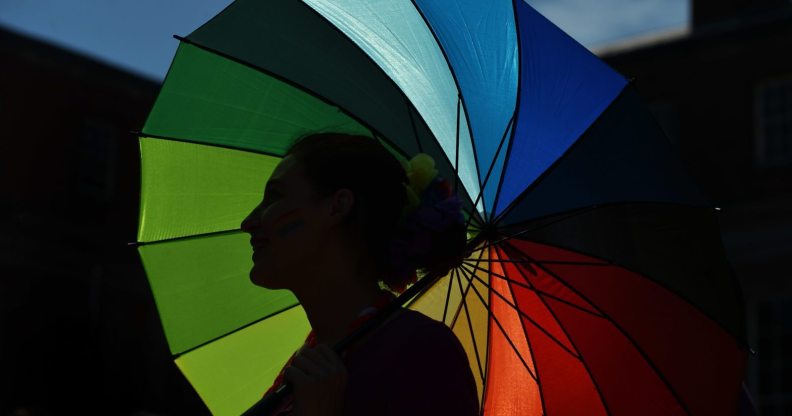LGBT+ Irish people three times more likely to contemplate suicide

(Photo by Charles McQuillan/Getty Images)
They may have been a spellbinding rallying force behind the repealing of the 8th amendment, but it appears that the Irish LGBT+ community is also struggling for equality in Ireland.
Although it has been three years since same-sex marriage was voted in by referendum, LGBT+ people are still facing despairingly high levels of suicide and self-harm, according to campaigners.
“Ireland should change what it means to grow up LGBT with marriage equality three years ago, but people need to know that it is still quite difficult,” the Executive Director of BelongTo Moninne Griffith told breakingnews.ie.

DUBLIN, IRELAND – MAY 26: Supporters celebrate at Dublin Castle following the result Irish referendum result on the 8th amendment (Photo by Jeff J Mitchell/Getty Images)
“The most recent report, LGBT Ireland, showed that young LGBT people are twice as likely to self-harm and three times as likely to contemplate suicide.
“That’s because of the fear of rejection, isolation and the bullying that they experience.”
However, the director of the LGBT+ charity said that the perception of being gay has “transformed” in the last fifteen years.

Supporters for same-sex marriage wait for the result of the referendum at Dublin Castle on May 23, 2015 in Dublin. (Photo by PAUL FAITH/AFP/Getty Images)
“15 years ago, Ireland was a different country for lesbian, gay, bisexual and transgender (LGBTI+) young people,” she said.
“Since we opened our doors in 2003, we have transformed what it means to be an LGBTI+ young person in Ireland by offering a safe space, advice, and life-saving support for young people and by reducing stigma, isolation and fear of rejection through changing hearts and minds about sexual orientation and gender identity.”
Ireland became the first country to legalise same-sex marriage by popular vote.

Gay rights campaigners take part in a march through Belfast on July 1, 2017 to protest against the ban on same-sex marriage. (PAUL FAITH/AFP/Getty Images)
In 2015 Ireland voted for same-sex marriage by a margin of 62 percent in favour to 37 percent against.
Leo Varadkar, Ireland’s openly gay Prime Minister, also hopes that the legalisation of same-sex marriage will be “a matter of time” in neighbouring Northern Ireland.

Ireland’s Prime minister Leo Varadkar (LUDOVIC MARIN/AFP/Getty)
“Difference makes us stronger and that’s something I believe in and something that I think can mark Northern Ireland out in the future,” he told the BBC in an interview.
“I totally appreciate that this it is an issue for the Northern Ireland Assembly, but we need an assembly up and running.”

